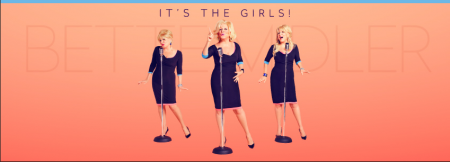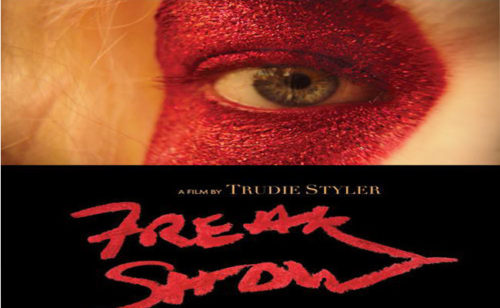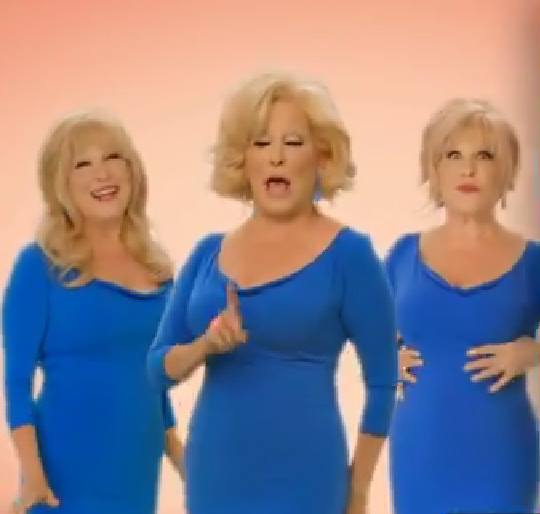PopMatters
Bette Midler: It’s the Girls!
By John Paul 2 December 2014
Throughout her career, Bette Midler has proven herself a versatile vocalist capable of tackling everything from bawdy cabaret to saccharine-sweet adult contemporary fare. On It’s the Girls!, Midler finds her muse in the works of girl groups from the Andrews and Boswell Sisters through to the Ronettes and Chiffons through to TLC. It’s a somewhat scatter-shot approach to the notion of the girl group sound that ultimately works perhaps a bit better than it should given the disparity of the acts represented. But this “greatest hits”-style approach to the history of popular music is not out of place in either Midler’s career or the cabaret scene from whence she came.
With It’s the Girls!, Midler shows a great affinity to the girl group sounds of ”˜60s, but is clearly most comfortable operating in the looser, more cabaret-indebted style in which she came up in the 1970s. In between Wall of Sound-era gems from the likes of the Ronettes, she jubilantly flaunts her way through a pair of tunes by the Andrews and Boswell Sisters that better suit her brassy, more freewheeling style. While her voice proves more than adept at tackling the prime ”˜60s girl group cuts here, her strict adherence to the original source material of each (from the phrasing on down to the vocal tonality of each) feels restrictive and lacks the necessary personality required to transcend the originals and play as anything more than a glossy homage..
Throughout, the arrangements give the feel of a big glossy production, stripping away any and all organic quality inherent in the originals. A minor sonic quibble, but if the producers here (veterans Marc Shaiman and Scott Riesett) sought to reproduce the feel of the songs Midler attempts to replicate virtually note-for-note in some instances, they overshot the mark with fussy arrangements that take some of the fun out of the original “teenage symphonies” helmed by the likes of Phil Spector. The arrangements here possess none of the wild-eyed innocence of the originals and instead possess the sharp focus and surgical precision of the more contemporary notion of music production.
The somewhat misleading opening one-two of the Ronettes’ “Be My Baby” and the Chiffons’ “One Fine Day”, each rendered in a rough vocal approximation of the original, creates the impression this will be a straight ”˜60s girl group homage with Midler inhabiting the lead role in each. But then comes a version of the Andrews Sisters’ “Bei Mir Bist Du Schön“. Though not nearly as anomalous is it would initially seem when taken within the full context of the album, it’s appearance immediately following two well-known girl group classics feels a bit jarring. That said, it seems to loosen Midler up some, finding confidence in her more stylistically appropriate, theatrical approach to popular song, an act honed over the course of her formative years.
While the chronological detour is brief (it’s followed up by the Shirelles’ “Baby It’s You”), it seems to free up both Midler and her accompanying musicians from strictly adhering to the original versions’ arrangements. Applying a more balladic approach to “Baby It’s You,” Midler hits a stylistic sweet spot between straight-up contemporary reinterpretation and original take on an oft-covered classic of the era that perfectly suits her abilities as both a performer and interpreter.
With her focus primarily on and the bulk of the material coming from the heyday of the girl group sound of the early-to-mid-”˜60s, Midler’s brief forays into more traditional and, conversely, contemporary material with her cover of TLC’s “Waterfalls”, unfortunately feel out of place and come across almost as afterthoughts.
Using the overarching tag of “girl groups” in the loosest sense of the term serves her point of including groups from the Andrews Sisters on up through TLC, but too often proves a somewhat uncomfortable listen. Going from a maudlin, overblown cabaret take on “Waterfalls” to a straight country reading of the Supremes’ “You Can’t Hurry Love” works thematically insomuch as both were originally performed by popular girl groups. Beyond that, it’s an odd pairing and even odder stylistic arrangement of each that, regardless of where either would have been placed in the album’s running order, would have sounded out of place.
On “He’s Sure the Boy I Love”, Midler invites original girl group vocalist and one-time Spector associate Darlene Love in to duet, creating an exuberant pairing that further supports the notion that Midler should have stuck solely with the golden age of the girl group sound rather than periodically straying in order to cover a broader range stylistically. Their voices well suited to one another, it’s a fine pairing that shows each still has plenty to offer.
But ultimately Midler clearly feels more comfortable with the older material, imbuing the Chordettes’ “Mr. Sandman” with a youthful vitality and level of theatricality not present on much of the rest of the material here, allowing for a more organic approach to the song’s reading and giving Midler the chance to go off book more than once. It is here in this freer, more improvisatory setting that she shines both as a performer and interpreter of other people’s material, truly inhabiting the performance in a manner making it her own rather than simply rehashing an existing framework to vaguely recast it in her own image.
Even though not everything here quite works, the tracks that do are a great deal of fun and show Midler in fine form. One of the most amusing moments comes during a seemingly ad-libbed exchange on the outro “Give Him a Great Big Kiss” wherein Midler subverts the tough-guy notion of the original’s love interest, recasting him as a nonagenarian whom she’s “known since the first time this record came out” and needs to be returned to his room at the ICU lest the nurses worry unnecessarily. It’s this lack of self-seriousness that makes Midler such an endearing performer and shows why some of her best work and, most notably, the work for which she is best known, spawned from the looser format of her nightclub act.












